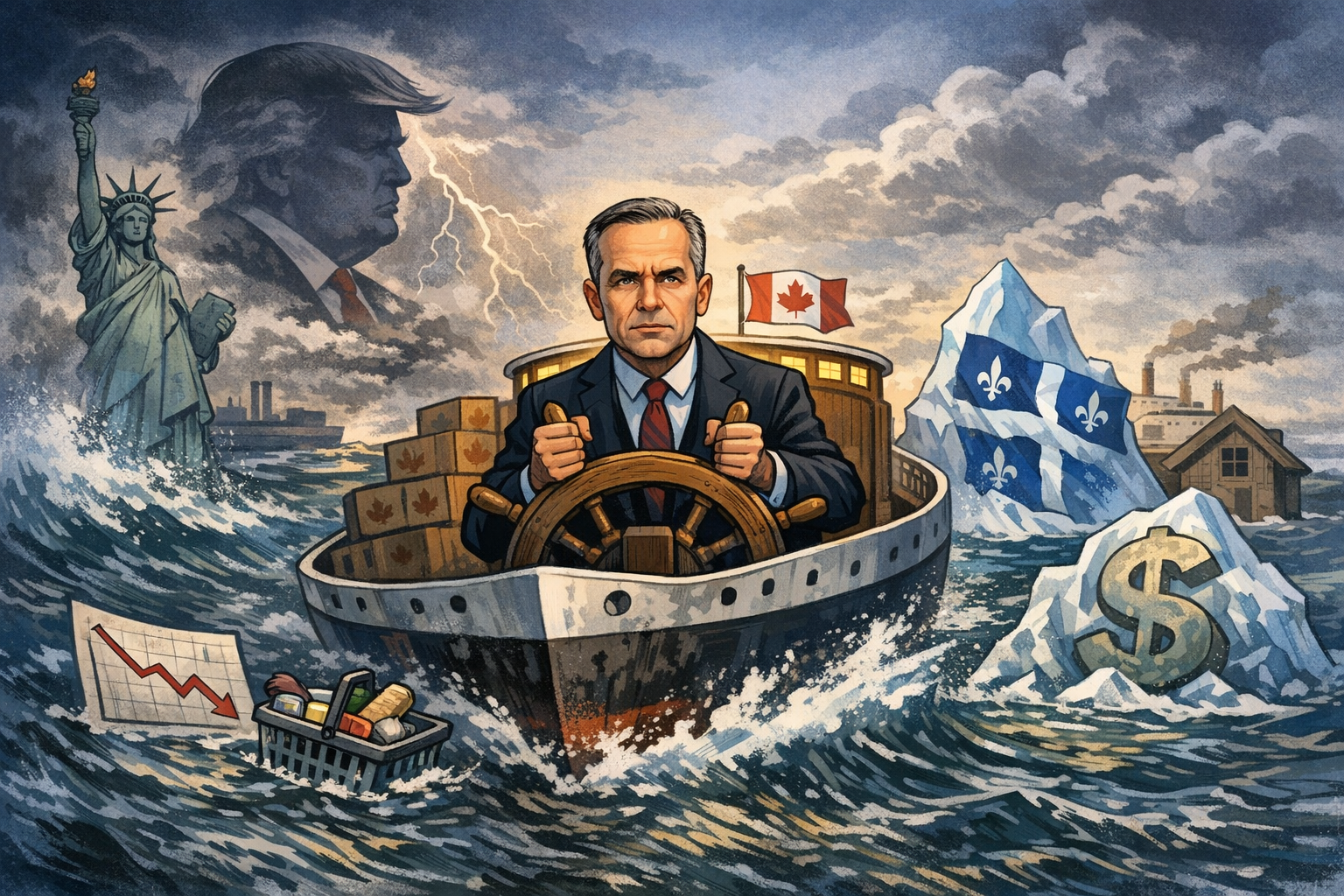The Youth Shift: Understanding the Drift Away from the Liberals
July 25, 2024
From June 20 to 25, 2024, Abacus Data conducted a national survey of 1,926 Canadian adults (18+) to examine the effects of the current cost of living and housing crisis on young Canadians. Additionally, we present data from our latest political outlook survey, collected between July 16 and 22, 2024, to shed light on recent voting intentions and perceptions of the top issues facing Canadians today.
The results reveal the main factors driving young Canadians away from the Liberal Party and boosting their support for Pierre Poilievre’s Conservative Party. Results reveal how current economic challenges are shifting young Canadians’ priorities and political views, emphasizing the urgent need for effective measures and actions to address their concerns and provide meaningful relief.
Vote Share by Age
Over the past year, there has been a notable shift in Canada’s political landscape, particularly evident among younger demographics. Once a cornerstone of support that propelled Justin Trudeau’s Liberal party to success, younger voters have now emerged as a major concern for the Liberals. Our analysis of post-2015 election data, along with trends from 2018 to today, reveals a significant decline in overall support for the Liberal Party, most prominently among Canadians aged 18-35.
The data paints a clear picture: Support among young Canadians, which peaked at 41% in 2015 and 34% in early 2021, has dwindled to just 22% today. This demographic, which played a significant role in securing Liberal majorities in 2015 and preventing defeats in 2019 and 2021, has shown a diminishing attraction for Mr. Trudeau and his party.
It’s important to recognize that this trend isn’t confined solely to younger voters but reflects a broader shift away from the Liberal Party across all age groups, with the most pronounced decline observed among the youth.
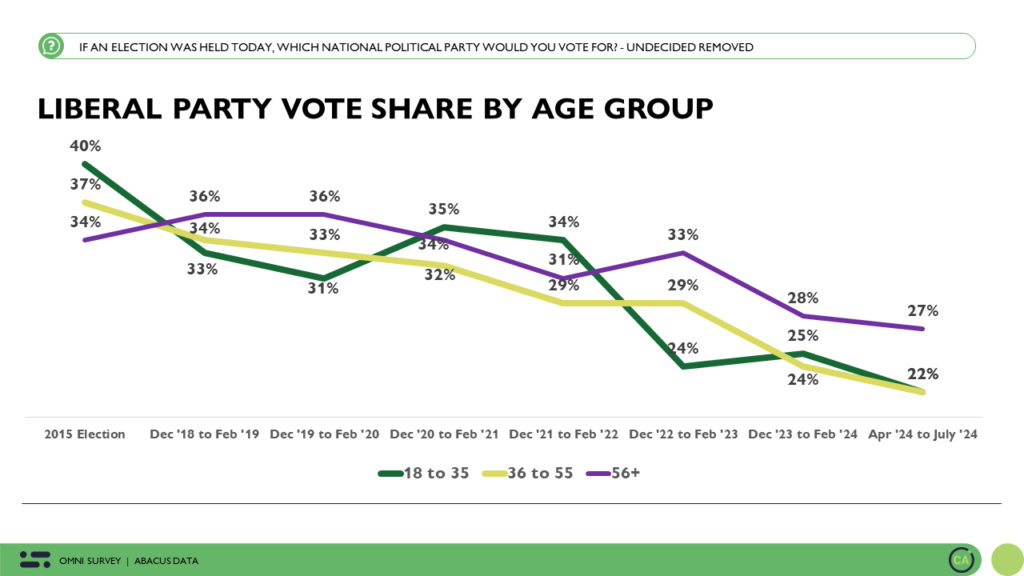
Conversely, examining support among 18-35 year olds, the Conservative Party of Canada, led by Pierre Poilievre, has capitalized on this shift. The Conservatives have seen the largest increase in support from young Canadians, with 37% of those aged 18-35 indicating they would vote for the Conservative Party if an election were held today. This is in stark contrast to the 22% who would vote for the Liberal Party.
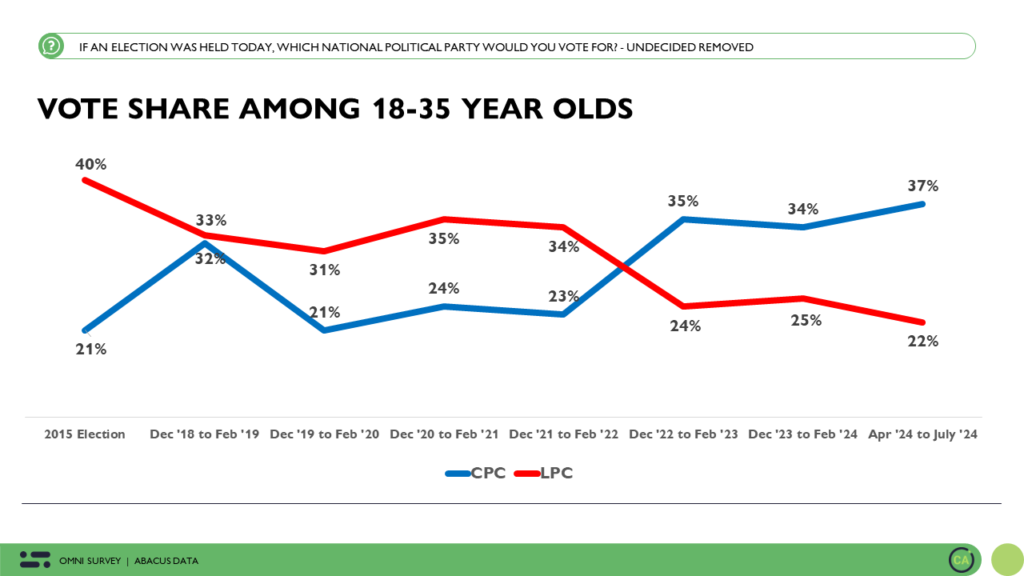
Top Issues Facing Young Canadians
The rise in support for the Conservative Party aligns with growing concerns among younger Canadians about housing costs, the economy, and the overall cost of living. Young Canadians are disproportionately affected by the housing crisis and are more likely to prioritize economic issues over healthcare, immigration, and climate change. Inequality and poverty also rank high on their list of priorities.
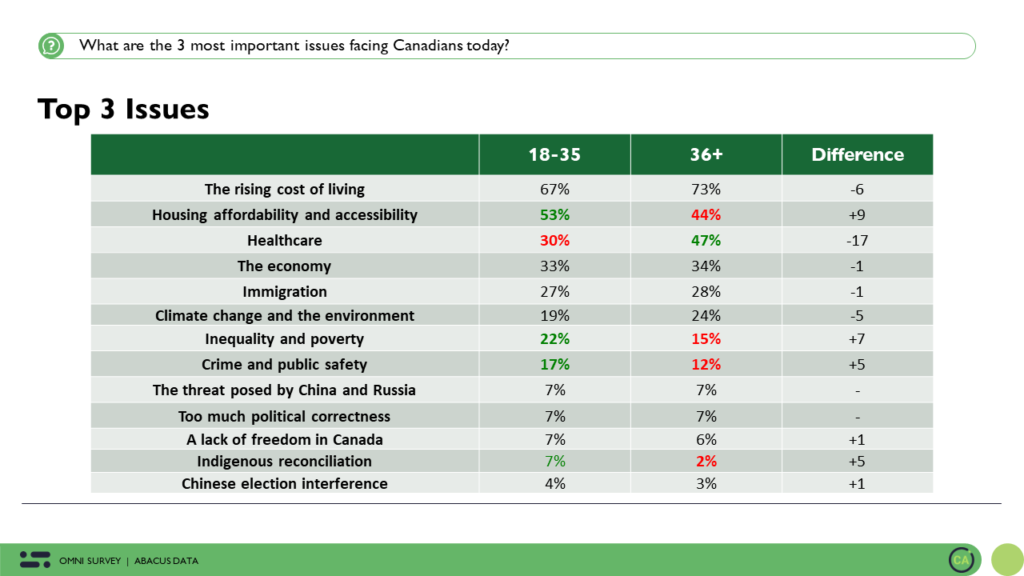
When considering who young Canadians believe is best suited to address the top issues facing the country today, the Conservative Party leads in handling the cost of living, housing, and the economy—the three most important issues to this demographic. In contrast, the Liberal Party is at a significant disadvantage on these key issues.
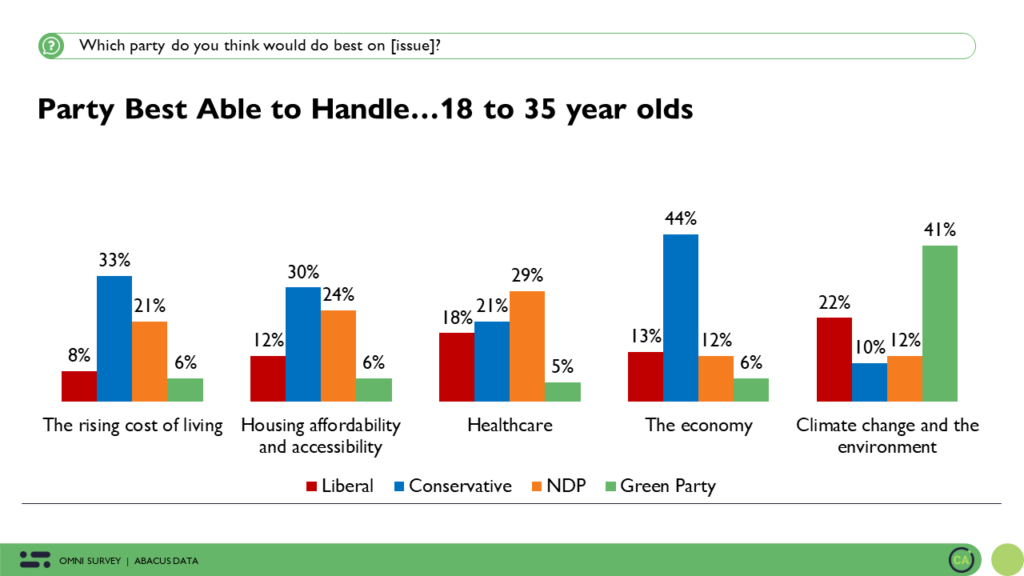
Impact of the Cost of Living and Housing Crisis on Canadians
Looking deeper, our research highlights the significant impact of the cost of living and housing crisis on young Canadians compared to older Canadians. Many of those who are 18-35 years old have been forced to delay major life events, such as buying a home (34%), renting a home (32%), having children 25%), pursuing post-secondary education (26%), and even getting married (18%).
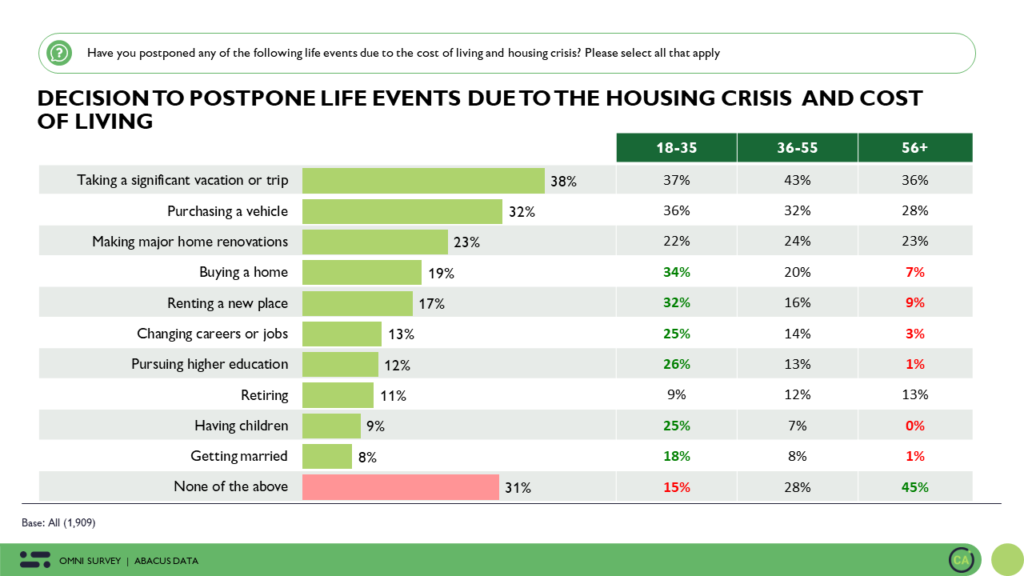
Young Canadians also appear to be disproportionately impacted financially—they are more likely to skip meals or reduce food quality to save money (37%) and express challenges paying bills on time (36%). Further, they are more likely to resort to selling personal items to help cover their day-to-day expenses (29%).
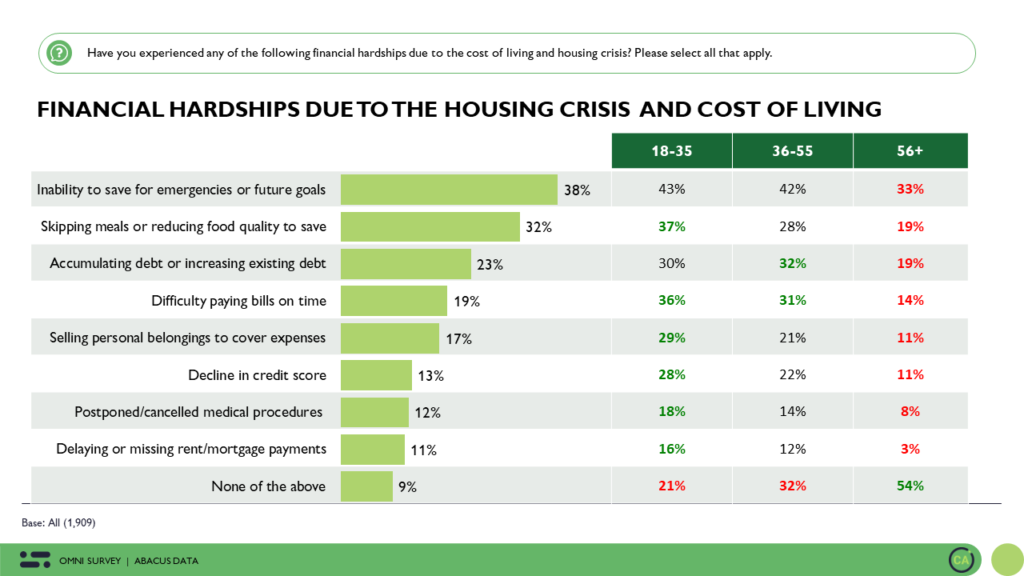
Additionally, many young Canadians have been forced to adjust their living arrangements due to the cost of living and housing crisis. Specifically, 21% have delayed purchasing a home, while 23% have opted to rent instead of buy. Furthermore, 19% indicate that they have moved in with family or friends.
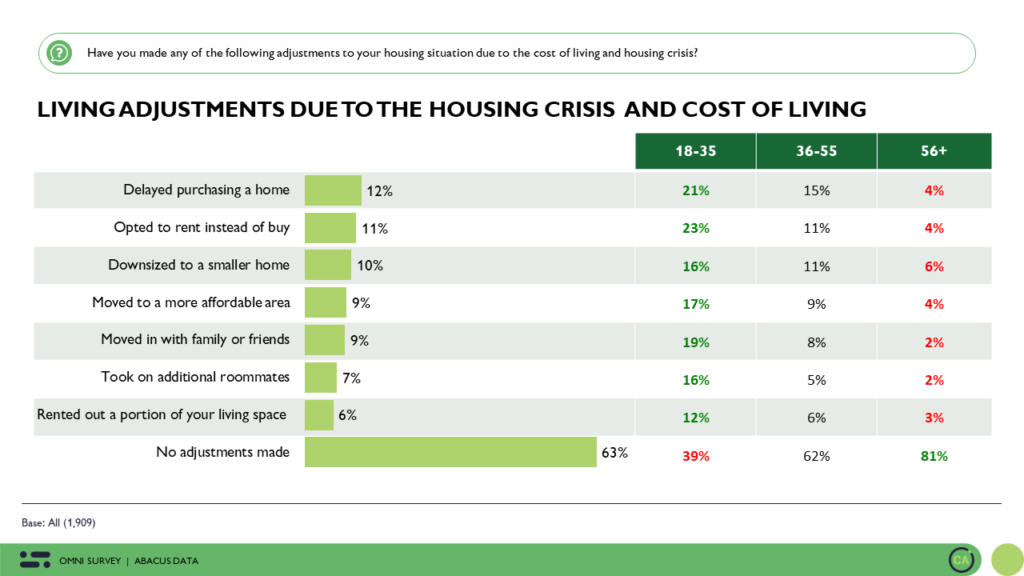
Taken together, the housing crisis has caused severe stress in 1 in 3 Canadians (36%), with 9 in 10 (91%) experiencing some degree of stress caused by the situation. This impact is even more pronounced among young Canadians, with 45% of those aged 18-35 reporting significant to extreme stress due to the housing crisis.
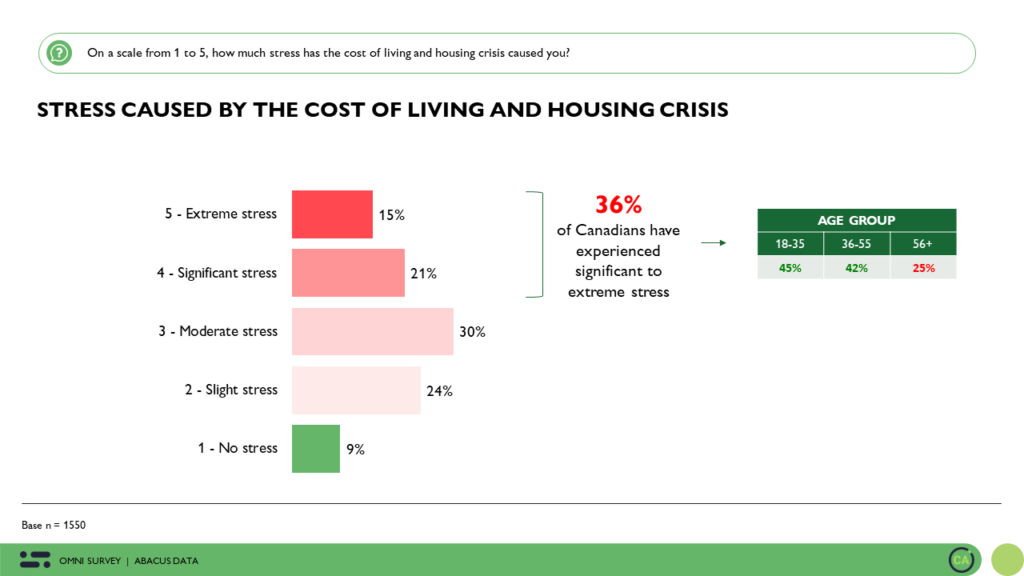
These challenges highlight the pervasive and multifaceted impact of economic pressures on young Canadians, fundamentally altering their life trajectories and financial stability.
THE UPSHOT
The current housing and cost of living crisis has hit young Canadians hard, reshaping their financial realities and political views. Once solid supporters of Justin Trudeau’s Liberal Party (and a cohort that helped push the Liberals to wins in 2019 and 2021), younger Canadians have shifted their vote intentions away from the Liberals more than older cohorts from about 41% in 2015 to just 22% today. Economic pressures have forced many to delay major life events and struggle with everyday expenses, pushing them to prioritize immediate relief over other issues, including climate change.
The political implication of this shift can’t be underscored enough. The Liberals cannot win without the support of younger Canadians and they are feeling the effect of the inflation and cost of living challenges more than any other age cohort.
In response, the Conservative Party, led by Pierre Poilievre, has gained significant ground among young Canadians who have sought an alternative. That shift may not be grounded in a complete understanding of what the Conservatives will do or whether their policy choices will lead to different outcomes, but young Canadians have likely concluded that change may be the only way to try and change the world that confronts them. And we see evidence of his in their view that the Conservatives are best able to handle the most pressing issues facing them: housing, affordability, and the economy.
The economic struggles faced by young Canadians have changed both their daily lives and their voting preferences. This highlights the urgent need for policies that tackle their specific issues and offer real relief and more, efforts to shift their mindset away from concern and zero-sum thinking to a wider appreciation for the efforts governments – at all levels – are genuinely making to make life easier.
METHODOLOGY
The survey was conducted with 1,925 Canadian adults from June 20 and 25, 2024. A random sample of panelists were invited to complete the survey from a set of partner panels based on the Lucid exchange platform. These partners are typically double opt-in survey panels, blended to manage out potential skews in the data from a single source.
The margin of error for a comparable probability-based random sample of the same size is +/- 2.19%, 19 times out of 20.
The data were weighted according to census data to ensure that the sample matched Canada’s population according to age, gender, educational attainment, and region.
This survey was paid for by Abacus Data Inc.
Abacus Data follows the CRIC Public Opinion Research Standards and Disclosure Requirements that can be found here: https://canadianresearchinsightscouncil.ca/standards/
ABOUT ABACUS DATA
We are Canada’s most sought-after, influential, and impactful polling and market research firm. We are hired by many of North America’s most respected and influential brands and organizations.
We use the latest technology, sound science, and deep experience to generate top-flight research-based advice to our clients. We offer global research capacity with a strong focus on customer service, attention to detail, and exceptional value.
And we are growing throughout all parts of Canada and the United States and have capacity for new clients who want high quality research insights with enlightened hospitality.
Our record speaks for itself: we were one of the most accurate pollsters conducting research during the 2021 Canadian election following up on our outstanding record in the 2019, 2015, and 2011 federal elections.
Contact us with any questions.
Find out more about how we can help your organization by downloading our corporate profile and service offering.




